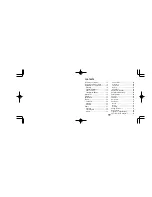
Operating Instructions
Chapter
8
CLV 490 Bar Code Scanner
8 009 993/O824/20-12-2004
©
SICK AG · Division Auto Ident · Germany · All rights reserved
8-1
Troubleshooting
8
Troubleshooting
8.1
Overview of possible errors and malfunctions
8.1.1
Mounting errors
•
CLV aligned incorrectly with the object carrying the bar code (e. g. blanking)
•
Reading pulse sensor positioned incorrectly (e. g. internal reading interval starts too
soon or too late)
•
With event-controlled focus control: sensors for object height detection positioned
incorrectly
8.1.2
Electrical installation errors
•
Interfaces on the CLV connected incorrectly (wiring error in CDB 420 or CDM 490)
8.1.3
Parameter errors
•
Functions not adjusted to local conditions, e. g. communication parameters on the host
interface are set incorrectly
•
Technical limits of the device exceeded, e. g. relationship between the scanning
frequency and the reading distance
8.1.4
Malfunctions
•
Start/stop mode: no external reading trigger, more than one object in the reading field
•
Tracking mode: gap between the objects in conveying direction fallen below minimum
•
Laser timeout for incorrectly terminated reading pulse exceeded
•
Device error (hardware/software)
8.2
Monitoring error and malfunctions
The CLV is self-monitoring:
•
After the power supply has been switched on, the CLV automatically carries out a self-
test, in which it checks important hardware components, before it is initialized
(parameter set loaded and device functions initialized). The self-test can be repeated
at any time by cancelling Reading mode. See
Chapter 6.5.13 Self-test, Page 6-58
•
If the CLV detects an error during the self-test or at any other time, it outputs the error
status ST= 3 on the host interface. Prerequisite: the error status is enabled for trans-
mission. This is disabled by default. The CLV displays the diagnosed error as a numeric
combination via the terminal interface (see
.
•
While it is in operation, the CLV constantly monitors the laser diode and speed of the
polygon mirror wheel. In addition, a watchdog circuit responds to error statuses. The
CLV carries out distance measurement referencing at regular cycles. To do so, the laser
diode is switched on for max. 10 s.
•
A timer (laser timeout) automatically deactivates the laser diode in Reading mode
("Sensor input" and "Serial interface trigger" mode) if the reading interval has not ended
after 10 minutes (default setting). However, it does not end the reading interval. In this
case, the CLV outputs the message:
"Laser safety timeout
"
on the terminal interface. The reading interval must be terminated by resetting the trig-
ger signal. The laser diode is activated again by the next reading trigger.
















































